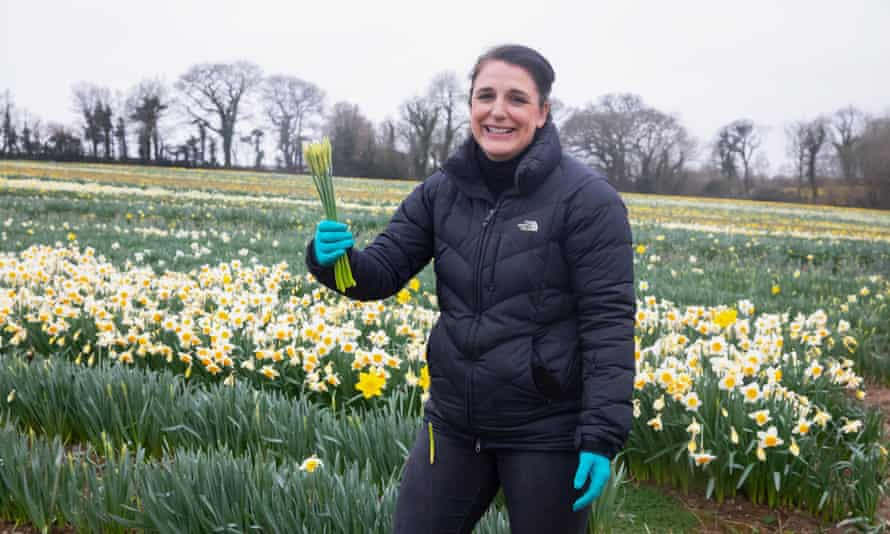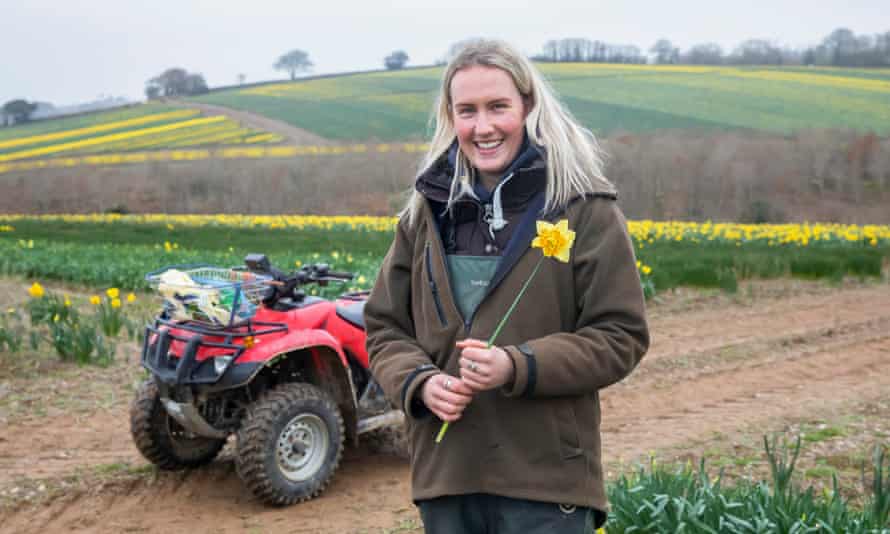It’s the kind of day when the cloud is so thick that a heavy greyness hangs in the air. But not in the fields of Fentongollan Farm in Cornwall, where swathes of yellow roll down the hillside, brightening the dull sky with spring cheer. Fentongollan is one of the world’s leading daffodil farms, growing globally renowned varieties that are a dazzling sight in full bloom.
“Yes, they do look nice, the yellow fields,” says Frances Hosking, 22, showing me around the land her family has farmed for generations. “But yellow fields are not good for us growers – they are a sign the crop hasn’t been picked. The flowers should be harvested before they have opened up – we want the fields to stay green.”
Daffodils are a multimillion-pound industry in Cornwall, home to 80% of the world’s crop. Over the past couple of decades, growers like the Hosking family have relied on eastern European labour to do the back-breaking work of picking each stem by hand in all weathers. The end of free movement following Brexit, however, combined with Covid restrictions, have made this season one of the toughest ever for recruitment.
“Everyone has been short of pickers,” says Hosking. “We need about 100 during our busiest time but we’ve only had about 80. We’re lucky, though – as a smaller farm we can just about manage.” Some farms have had only half the number of pickers they need, and acres of flowers have been left to rot.
Like many other growers, Hosking says she has tried to recruit locally but without much success. “We’ve had some furloughed workers and a couple of students. One mum brought along her two sons, aged 18 and 20. She said they were really keen but when they got here, it was obvious they weren’t keen at all. Thankfully their mum had waited for a bit in the car park, so she took them home,” she says. “I don’t have time to cajole people into working. I need people who will just get on with it.”

But what’s the job really like? Why is it hard to get workers? I’m a local mum with some time on my hands, so I joined Hosking and about a dozen pickers in the field at Fentongollan to try it out myself.
Hosking gives me a pair of latex gloves, a small length of fishing wire and some elastic bands. “You’ve got to use your eyes,” she says. “Look along the row for the closed ones and the tall ones. Now, reach down to the bottom of the stem and pull.” When I have 10 stems, I make them level, wrap my fishing wire round the ends and squeeze until it cuts them off. Then I put an elastic band on, and my first bunch is done.
It’s mid-morning and a tractor carrying about 10,000 bunches has already left the field. This seems pretty easy, I think, as I lean over the rows. I’ve done about five bunches when the field supervisor, Costel Iosif, 31, comes to examine my work.
“Too open,” he says, discarding ones where the buds were beginning to split. “Too short,” he says, discarding more. “Don’t worry, you’re doing fine,” he says. “You will get better the more you do it. I don’t care how many bunches you pick on your first day. It’s about the quality of the job you do and getting better at it.”
If you don’t pick enough, the farm will make up your pay to minimum wage. To earn more than minimum wage, you need to pick at least 800 bunches a day. That sounds like a lot to me as I struggle with my fishing wire, but Iosif says a decent picker will easily do that after a bit of practice, making GBP130-GBP140 a day.

The best workers are picking around 1,600 bunches a day at the peak of the season – earning GBP20 per hour, close to GBP200 for the day.
I head down the hill to see Fentongollan’s power pickers in action – a couple from northern Bulgaria, Yanka Raicheva and Ivaylo Bozhkov, both 31. It’s their sixth season here. “The rain slows you down a bit, but not the cold. You work faster to keep warm,” Bozhkov says, still picking while we talk.
They are each earning around GBP900 a week picking daffodils, so they make enough from their few months in the UK to not have to work the rest of the year at home. “This is the perfect job for me,” Bozhkov says. “I am very happy doing it.”
“They come to earn money, and that’s it. These are very good wages for them,” says Hosking. “For English people, there are other types of jobs they can do – they have other choices.”
The job is very physically demanding and requires being out in all weathers, including gales and driving rain. Farms are also remote – it isn’t always practical to live on site like overseas workers do.
The reality is that people like Bozhkov and Raicheva are probably always going to be needed in UK fields, especially while the price of daffodils is as low as 99p a bunch. Margins are tight, and farmers need fast pickers to work all season to make their business viable.
I have spent too much time talking and enjoying the glorious views to properly master the art of daffodil picking. So I leave Hosking and her team at Fentongollan as they gear up for the final push of the season.
They will be working flat out next week to meet the surge in demand for Mother’s Day on 14 March, picking thousands of stems for mums like me, no matter what the Cornish weather throws at them.